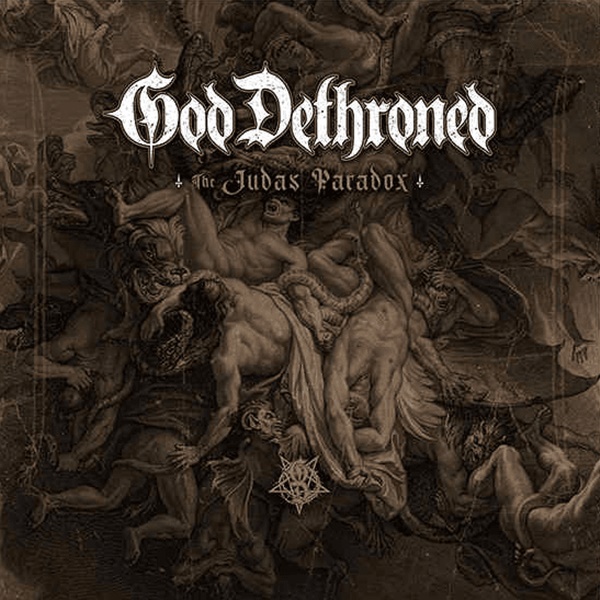When you’ve been purveyors in the extreme metal landscape since the early 90s, there’s a certain amount of respect bestowed upon your efforts. Dutch act God Dethroned possess numerous albums worthy of praise that sustain the test of time – for this scribe put Bloody Blasphemy, The Toxic Touch, and Passiondale in that category. Beyond the blackened death metal foundation lies aspects of left-field nuances that are more melodic or catchy, without diminishing the core elements that appeal to the faithful legions. Releasing their previous studio record Illuminati one month before COVID-19 killed all momentum in terms of proper live tours globally, it’s easy to understand that the band took their time to regain inspiration for The Judas Paradox. Thanks to multiple songwriters and a distant compositional approach, the results prove these gentlemen have not lost their aggression, energy, or professionalism in the genre.
The tranquil guitar lines of the opening title track soon give way to an explosive mix of mid-tempo, marching riffs as guitarist/vocalist Henri Sattler intertwines his normal blackened death roar with some gothic-oriented clean aspects, the extended solo break from Dave Meester thoughtful in its slower to heroic measures. From there normal blasting proceedings take hold during “Rat Kingdom”, where drummer Frank Schilperoort matches the tremolo-fueled action at break neck paces, the intensity haunting while the transitions prop up at least expected places. The flow of the record from that point continually diversifies between arrangements that are chock full of intense riffs with the right harmony/melodic components against songs more controlled, focused, pulling from darker/alternative influences which elevate the dynamic appeal. You can have a more Viking-like attack with axe play slinging blades of steel during “The Eye of Providence” one moment, then be swept through the undertow in jackhammer fashion through the key verses/chorus of “Broken Bloodlines” – the lyrical themes spanning everything from pandemic-related situations to ancient history, religious blasphemy, and similar dark/occult-oriented subjects. It’s amazing that the quartet continually summon all the power of the mind, hands, and feet to demonstrate ferocious blackened death metal can still connect in retainable ways twelve albums deep into their career.
Where will The Judas Paradox sit in the catalog of God Dethroned after a comfortable number of spins? To this scribe, it’s the ideal amalgamation of deadly riffs, whirlwind tempos, and savage screams balanced out against the earworms and melodic/harmony twists or transitions to showcase the group in the best light possible. If you’re late to the discography, this would be an ideal starting point to absorb.


